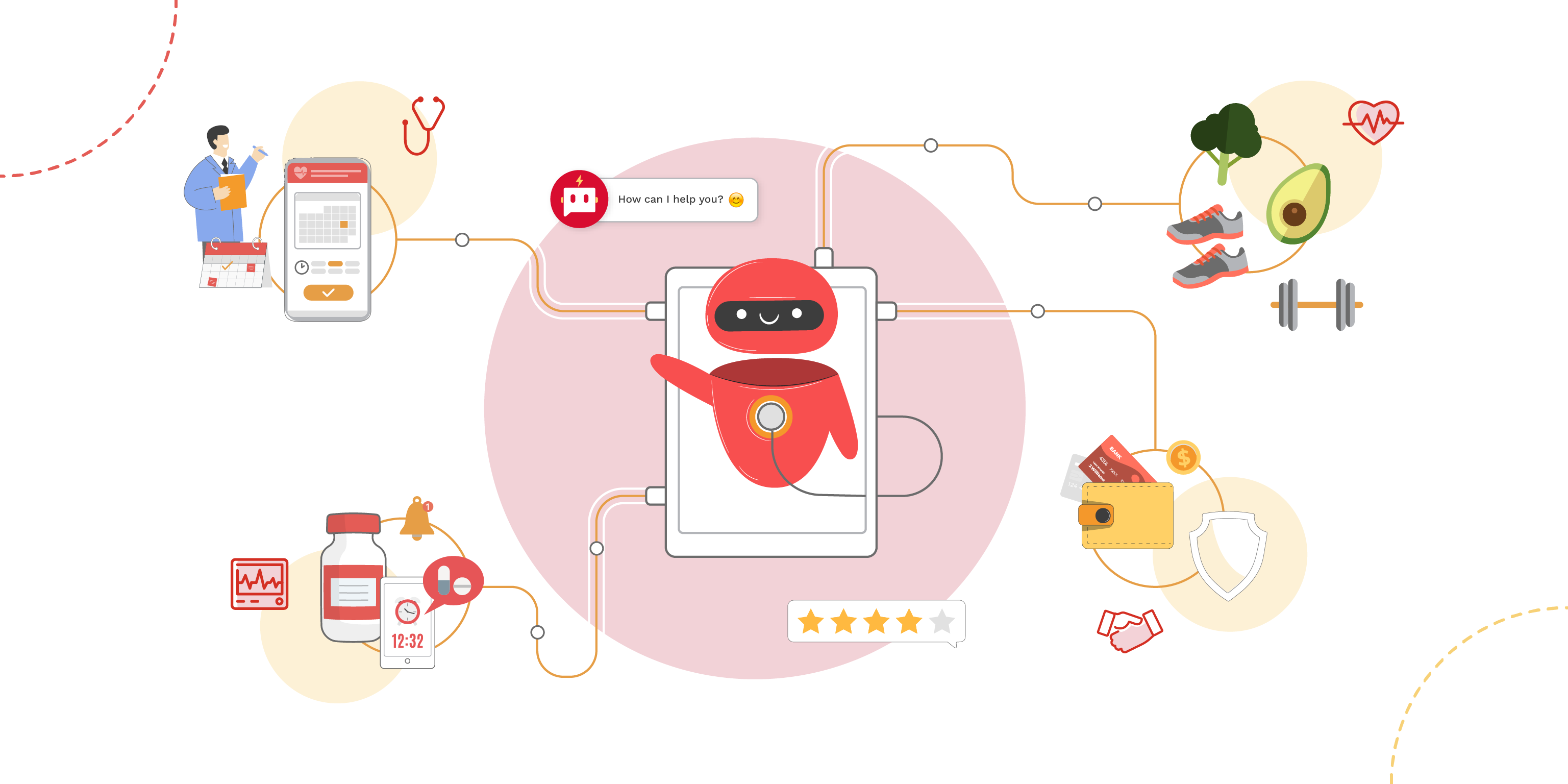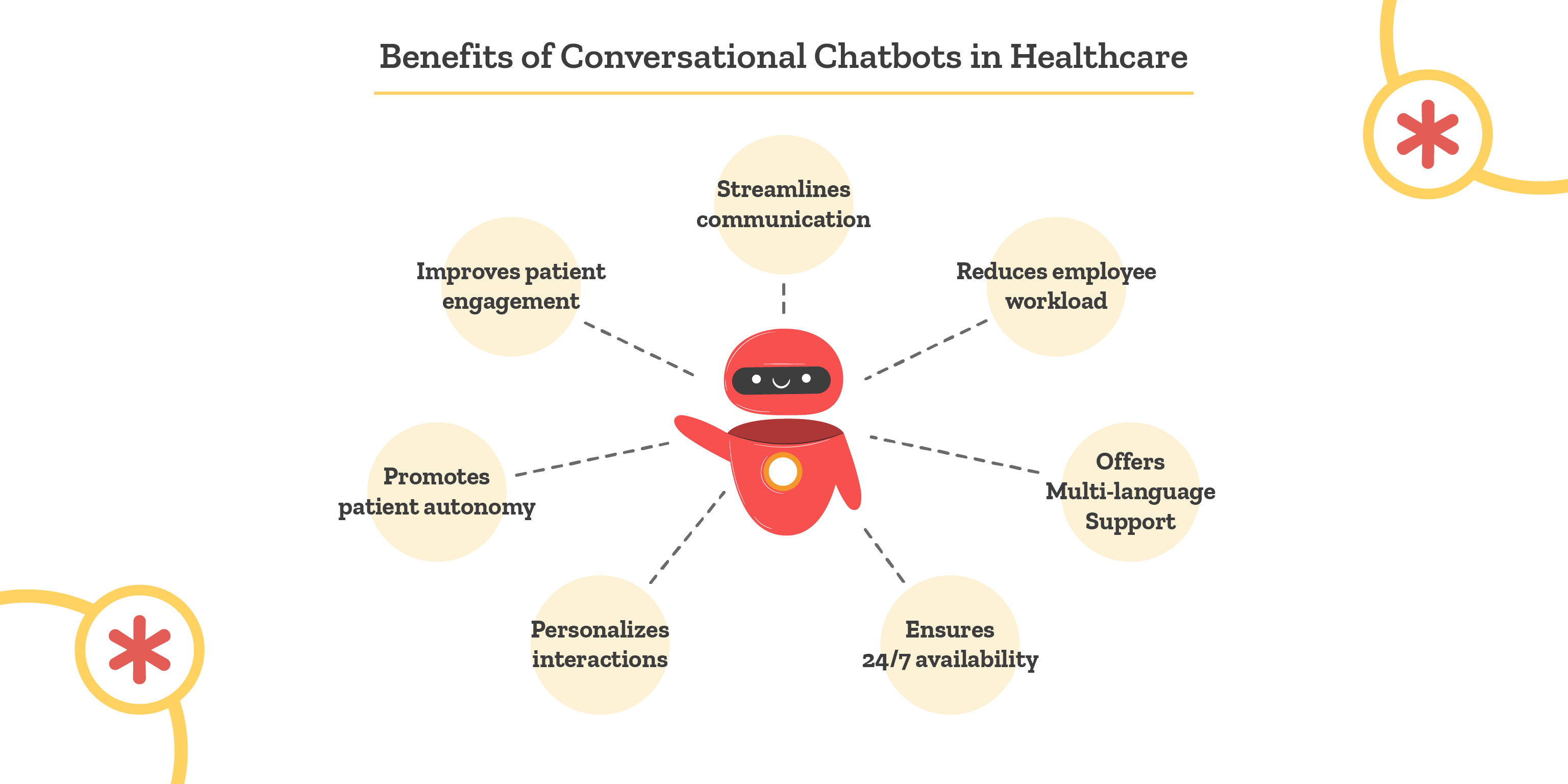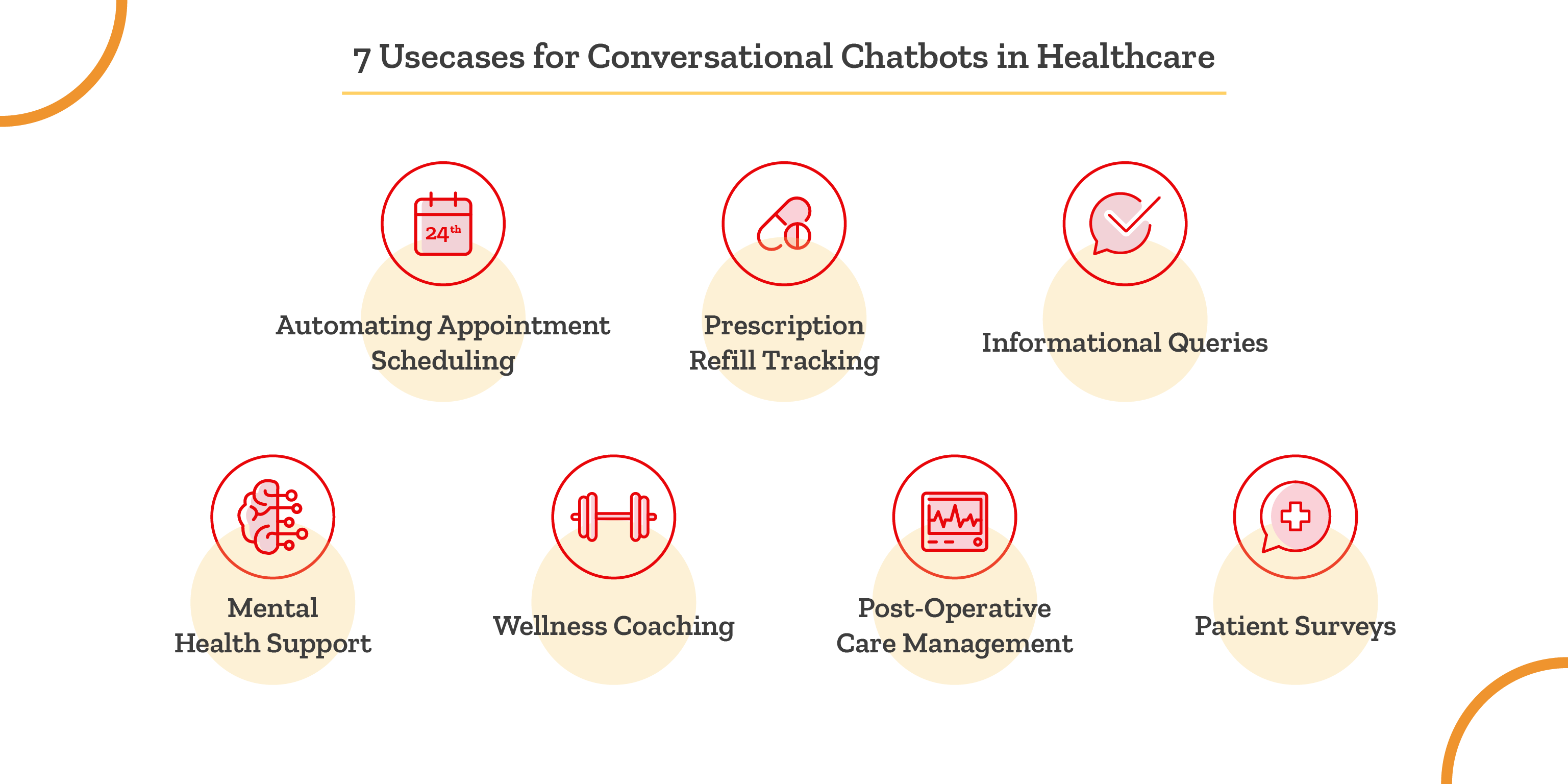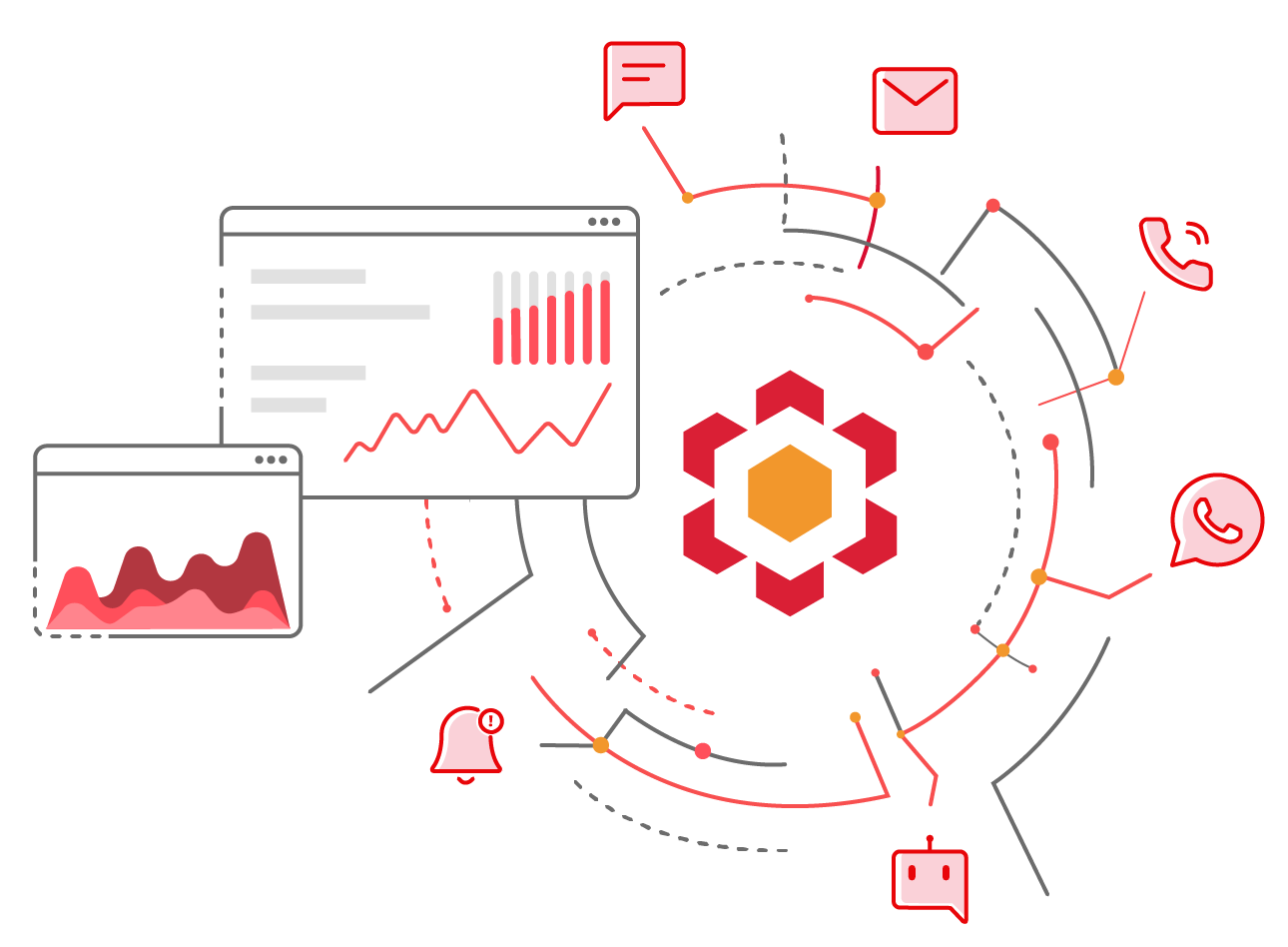
The COVID pandemic accelerated healthcare delivery innovation and led to the widespread adoption of digital tools worldwide. However, while most patients have become comfortable with technology, they also crave simple solutions and coordinated care where they spend less time figuring out the next steps. As healthcare systems are exploring new technologies, it’s evident that a patient-centric approach is crucial to improve outcomes. Conversational AI in Healthcare transforms patient experiences by empowering patients to make informed decisions and access critical services with minimal effort.
Benefits of Conversational AI Chatbots in Healthcare
The healthcare industry faces several challenges today, such as the mounting need for the interoperability of newer technologies with legacy systems, labor shortages, and demands for quality care. AI chatbots have the potential to bridge gaps in healthcare delivery and help patients easily connect with medical professionals and get timely care while lessening the burden on the professionals. Around one-fourth of organizations will use chatbots as a primary customer service channel, according to Gartner.
With data and analytics playing significant roles in how organizations optimize processes, conversational AI can provide strategic insights to enhance patient experiences. Conversational chatbots, unlike conventional chatbots, are capable of empathetic conversations, which are critical in healthcare. Moreover, there is less friction than in mobile apps, where downloading and remembering passwords can be barriers to regular use.
Conversational chatbots offer a range of benefits, including the following –
- Streamlines communication
- Improves patient engagement
- Promotes patient autonomy
- Personalizes interactions
- Ensures 24/7 availability
- Offers Multi-language Support
- Reduces employee workload
- Automates repetitive tasks
- Provides cost efficiency
- Supports instant access to information
- Facilitates Consistent and accurate answers to FAQ
- Training staff and educating patients
- Highlighting services and benefits
- Gathering feedback

How to Use Conversational AI in Healthcare?
Healthcare providers can cater to diverse patients’ needs by embracing conversational AI. Here are the top 7 use cases of AI healthcare chatbots –
1. Automating Appointment Scheduling & Reminders
Missed appointments lead to loss of revenue and inefficient utilization of healthcare provider resources. Conversational chatbots help patients quickly schedule their appointments through a chat interface that is convenient to use. Moreover, they can send timely reminders, significantly reducing no-show rates and saving time and resources.
Patients may often make appointments much in advance, so rescheduling has become common. However, many may find it a hassle to call a healthcare provider and cancel the current appointment. Moreover, finding another time slot that works for them and remembering the new appointment date can be tricky.
With chatbots, patients and caregivers can easily cancel an appointment and choose from the available options to reschedule. Additionally, automated reminders ensure that patients do not have to worry about missing their appointments.
2. Medication Assistance and Prescription Refill Tracking
Conversational chatbots can automate requesting prescription refills by setting up alerts for when to replenish medications. Moreover, patients can also view their past and current prescriptions, reorder from their pharmacy, and get notifications on the expected delivery date.
Conversational AI ensures patients never miss a dose and help them track their medication stock and intake. In addition, chatbots can share helpful information on drug interactions and possible side effects.
3. Informational Queries
AI-powered medical chatbots can help all stakeholders get the correct information at the right time. Patients can have pressing questions about healthcare plans, pharmacies, insurance coverage, etc. Chatbots can serve as a central point for getting essential details for patients to make a healthcare decision.
Healthcare chatbots can instantly answer queries, such as locating a nearby healthcare provider or understanding diagnostic procedures and protocols to follow during hospital visits.
The conversational nature of AI chatbots makes them a fantastic tool for patient education and engagement. In addition, the ease of accessing information helps patients have more control of their healthcare journey.
Dealing with medical bills and navigating insurance claims can often be a time-consuming process. Chatbots can guide patients on how to pay bills and submit claims.
AI-driven conversational chatbots can provide personalized advice by asking a series of questions that help patients evaluate their symptoms. Since patients get curated information and customized advice, they can ascertain the severity of their symptoms and decide whether to seek professional advice. Chatbots support virtual triage and aid in reducing unnecessary hospital visits, saving patients’ time, and freeing up healthcare provider resources for those who really need them.
4. Discreet Mental Health Support
The negative societal attitude surrounding mental health issues can prevent many individuals from getting much-needed help. Since mental health is a sensitive topic for many, it may be daunting to open up about their struggles.
Chatbots with advanced Natural Langauge Processing (NLP) capabilities can efficiently interpret queries and offer human-like conversations. Many individuals can find discussing their mental health issues with a non-judgmental medium.
Chatbots that treat mental health discussions use conversational messaging with the utmost sensitivity and can be a source of emotional support and be available 24/7 for patients.
Moreover, conversational chatbots can promote mental health awareness by providing prompt and personalized support to users with depression, anxiety, and other common mental health conditions.
5. Health and Wellness Management
With the focus shifting toward holistic wellness, chatbots’ repository of knowledge is a boon for patients. Conversational chatbots can help patients and caregivers educate themselves on nutrition, workouts, and sleep routines. In addition, they can virtually coach patients to lead a healthy lifestyle by offering tailor-made tips and plans.
6. Post-Operative and Recovery Care Management
Patients need support even after they leave the hospital. In factor, post-operative care is crucial to a speedy recovery. Conversational AI chatbots can effectively guide patients on medications to take and deliver recovery care instructions. Moreover, they can help track progress and explain any potential complications to look out for.
Conversational bots can facilitate interactions between patients, caregivers, and healthcare providers during the recovery phase. In addition, they can streamline processes and optimize care coordination, providing consistent support for post-discharge healthcare.
For example, chronic illnesses typically require ongoing management such as lifestyle modifications and regular symptom monitoring. Conversational AI can be an excellent tool to support patients by being available round-the-clock and answering questions in real time.
7. Patient Surveys and Feedback
Artificial intelligence healthcare chatbot systems can simplify the process of collecting patient patients with automated satisfaction surveys. Since patients can quickly provide their feedback from their smartphones or the devices they are already on, it helps healthcare providers to derive valuable insights. With chatbots, patients and caregivers can simply tap a button to effectively provide feedback that can help medical professionals identify areas of improvement and tackle issues to improve their service offerings further.

Future of Chatbots in Healthcare
Artificial intelligence presents an exceptional opportunity to reshape the future of healthcare. As AI and NLP capabilities keep improving, they can improve healthcare delivery in numerous ways.
Chatbots can not only automate administrative tasks such as data collection but also use that data to offer personalized advice and promote offerings for better engagement. Integration with other business systems, such as payment gateways, Customer Relationship Management (CRM), and Analytics platforms, ensures that all data points are taken into account during patient interactions.
For example, chatbots can consider recent symptoms, vital stats, genetic makeup, family health history, and allergy profile to provide a comprehensive overview of a patient’s health.
Moreover, conversational chatbots are easily accessible and hence can democratize healthcare by allowing expert guidance available to everyone.
As the world moves towards a more technology-driven future, healthcare providers must keep up with the latest tools to meet service demands. Explore the power of chatbots using conversational AI in healthcare and provide more efficient, patient-centered care.
Are you looking for ways to leverage conversational bots for your organization? Contact our experts today!

Kalaivani Narayanan
Content Specialist
Supercharge Your Communication!
Get in touch with our experts who strive hard to bring the very best in cloud communications technology to you.

